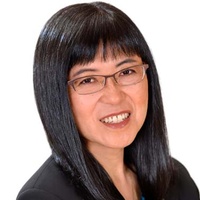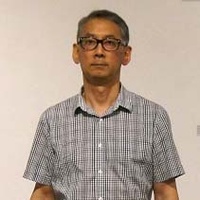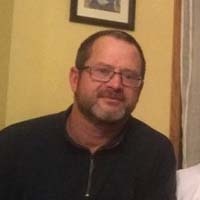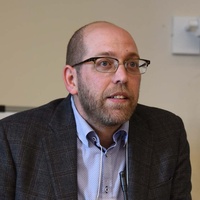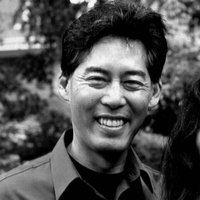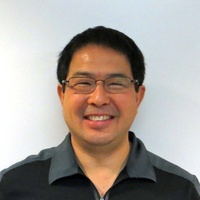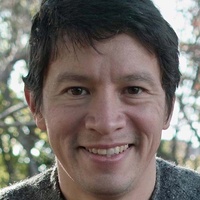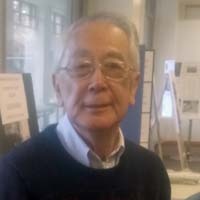“Many people still do not know the full story about the internment of Japanese Canadians. My maternal grandparents, like other families who never returned to the west coast, remained in the tiny village of Slocan, and never returned to Cumberland (Vancouver Island) where the family had settled in the 1800s. Everything they owned was taken by the government. My father had to look after his mother (his father died during internment) and younger siblings so he never achieved his dream of going to university to study medicine. So much was taken, and our families endured. Their stories must be shared, and we must all learn so the injustice is not repeated with anyone else.”
— Lorene Oikawa
Yonsei, President of the Greater Vancouver
Japanese Canadian Citizens’ Association
“As I get older the deeper my understanding becomes of the anguish and suffering that my grandparents, parents and their siblings endured. Both my mother’s family and father’s family lost farms that had taken years to establish. My father has said that his family thought they might be allowed to stay in order to care for the daily needs of their livestock but, of course, their wish was denied. In an instant they lost almost everything including their liberty. I have the utmost respect for what they accomplished in spite of the huge injustice and trauma they experienced.”
— Warren Hoyano
Sansei artist from Brampton, ON.1
“What does the 75th anniversary of the Japanese Canadian (JC) internment mean to me? Like other ill-conceived policies of the past – the residential school system also comes to mind – the JC internment unfairly targeted and unjustly discriminated against a certain group of people. Although it seems inconceivable that such an atrocity could happen again in a country as open, tolerant and culturally diverse as present day Canada, the 75th anniversary serves as a stark reminder of this terrible mistake, gives pause to reflect on the mistake, and serves as a cautionary tale that ongoing vigilance is required so a similar mistake is never repeated.
PS. Like the aforementioned residential school system, I fear many Canadians are unaware of the history of internment and persecution JC’s suffered and the anniversary should also be used as a platform for awareness to disseminate information in the hopes that it never happens again.”
— Paul McLaughlin
Calgary Businessman2
“I’m new to active engagement in this area, having been researching and writing about it for only about 7 years. I’m conscious, in thinking about this date that for many members of the community, this anniversary is a marker on a much longer road. I’m still gratified to be able to contribute my part toward the memory of this date, particularly in the year of the 150th anniversary of Canada, a year that, as indigenous activists have made clear, needs to be remembered in complex and critical ways.”
— Dr. Jordan Stanger-Ross
Head of Landscapes of Injustice project at University of Victoria, BC.
Co-author of the newly released book Witness to Loss
“How do I feel about the 75th anniversary of the internment? It is an exciting time to be interested in the internment. As an elementary school teacher, I am currently writing new lessons for Landscapes of Injustice (Jordan Stanger-Ross’ massive scholarly study of internment from the dispossession focus). And there are so many other projects and initiatives in the last few years that are bringing new attention to internment, including:
- internment being included in the revised BC Social Studies curriculum;
- Mas Fukawa’s and Henry Tanaka’s books on Japanese Canadian fishermen;
- Tosh and Mary Kitagawa’s (and others’) book Honouring Our People3 which recounts the recollections of internment and relocation survivors;
- the Hastings Park and Stanley Park memorials;
- the province of BC recognising 56 historic Japanese-Canadian sites, etc.
The number and breadth of these projects and initiatives show that the internment is not just an important part of Japanese Canadian history, but an important part of Canadian history.”
— Greg Miyanaga
Leigh Elementary school teacher in Coquitlam, BC.4
“In recent years the eminent scholar and social activist, Noam Chomsky, has declared America to be more civilized than it was five or so decades ago. I think we can make a similar claim for Canada. I am old enough to recall another Canada that was more intolerant and suspicious of “differences” and cared less about a lot of things we stand by today. Nevertheless, on this 75th anniversary of the appalling and brutal injustice done to the Canadian Nikkei, it would do us well to ponder. Looking south we are witnessing how manipulation and blurring of truth and fact can expose the most virulent and visceral reaction among citizens. The protracted efforts on the part of both young and older Canadians to keep the historic facts, as well as the stories of the incarceration and dispossession of the Nikkei, can only serve to remind us that we must stand guard on language and baser behavior. Progress is so easy to lose amidst fear and misguided passion.”
— Lorne Spry
Formerly of Richmond, BC, now living and working
as an English lecturer in Sendai, Japan
“I find this year to be particularly poignant to be commemorating the 75th anniversary of internment. With a renewed interest in my family history and Japanese heritage, I find myself needed to go back and check details and collect stories from my elders. With the passing this year of my mother and my aunt who was 11 years older than mom, it is strange to not have them there to provide this information. It has hit home that the survivors, and their stories and memories of internment are truly on the brink of being lost forever. I am grateful for the stories that have been passed along and I regret that I had not started earlier. I am hopeful that Landscapes of Injustice will help contribute to the education and memory of the Issei, Nisei and their legacy.”
— Michael Abe
Sansei, Project Manager for Landscapes of Injustice project,
University of Victoria, BC.
“The 75th Anniversary of the Internment is a chance to reflect on how far we have come – and how far we have yet to go. We don’t need to look hard to remind ourselves that there is much in the story of the Japanese Canadians that is dangerously on the verge of being repeated. It’s a story the needs telling and retelling, and we must learn and relearn how this can be done, and to whom and when it must be told. It is the legacy and burden of our past, it is unique and it must be shared.”
— Junji Nishihata
Montreal Sansei, published father Jesse’s Powell Street Diary in 2017
“I was 10 years old when the war started so my recollections of the war was fun and adventure. I experienced racism like being called a ‘Jap’ but I didn’t know it was racism. Once the war started we moved so many times starting from Marpole to downtown Vancouver to Hastings Park which was a revelation to me as a kid: a totally new adventure of being confined and seeing Royal Canadian Mounted Police around the park.
My mother on the other hand, suffered turmoil and a terrible time as my father had died four year previously. There were 4 kids to take care of with all of the things going on then being thrown into Hastings Park which was a terrible, terrible place. It wasn’t until I got older that I appreciated what my mother went through and she ended up dying in a ‘ghost town’ for lack of hospital care. I’ve told the same story at my grand childrens’ school... "Just imagine the police coming to your house on a given day and told that you had to be out of your house in the next few days and– could only take what you could carry in a suitcase". That is what happened. Now, with all of the racism that is going on now, it is important to remember what happened to us was because we were of a different colour. I still remember being called into the school principal's (Mr Harvey) office with 6 or 7 other Japanese kids and telling us "We will not be allowed to return to the school...but hope to see when the war is over", (David Lloyd George public school) in Vancouver. We just accepted this as how things were. In 2017, I know what the government did to us, what my mother went through and appreciate what my 21-year-old sister, Takako, who became the matriarch of the family and kept us together as a family during and after those very difficult times”.
— Masayoshi “Mush” Arima
Nisei retired graphic artist (age 85)5
Notes:
1. Parents formerly of Port Hammond and Mission, BC now living in Montreal, Quebec.
2. His wife Aya (Sendai, Japan) and sons: Riki and Ryu.
3. This book was edited by Randy Enomoto and published by the Greater Vancouver
Japanese Canadian Citizens’ Association in 2009.
4. Winner of a Governor General’s Award for Excellence in Teaching Canadian History in 2006 for designing a Grade 5 unit about World War Two JC Internment.
5. His father Itaro died in 1939 at 52 years old, in a workplace accident, at B.C. Box Lumber Mills – Marpole, B.C. Mother Same died in 1944 at age 47. There was no hospital care in Bayfarm so she was sent to the New Denver hospital where she passed away. Sisters—Takako and Toshiko—and brother Yoshifumi are “all still living and in reasonable health”, he reports.
© 2017 Norman Ibuki


